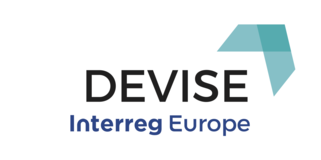DEVISE is arriving to the end. After having exchanged good practices and experiences, inspired each other within the partnership and developed 10 Regional Action Plans, it's time to review the changes achieved in each of the policy instruments thanks to this project. This week, we speak with Stéphane Langlais, Laval Mayenne Technopole (France).
What policy instrument were you addressing when the DEVISE project commenced? Why?
We addressed the ERDF Programme "Pays de la Loire" which aims to create a dynamic economy to place the region among the most developed in Europe, by supporting ‘the capacity of SMEs to grow in regional, national and international markets as well as engaging in innovation processes’. We have decided to specifically address this policy instrument because one of the challenge underlies by it is to promote the adoption and dissemination of digital tools. The ERDF will thus intervene for the development of applications with high added value for the creation of intelligent services (Industry 4.0, IoT, Virtual Reality, Big data, geographical information, etc) and the development and support of uses. The DEVISE’s objectives were consistent with the stakes tackled by this policy instrument and could thus enriched it.
What has specifically changed in your policies and your region thanks to the project?
Inspired by what we discovered during the DEVISE project, we and our stakeholders are implementing actions to help remove the obstacles to the digital transformation of companies:
- A lack of knowledge of the traditional companies about new technologies, their impact and how to implement them
- A fear concerning the implementation of new technologies and the disruption that could be caused on the model and the processes of the firms, and on the relations with their employees and clients.
- A view that digital transformation is a difficult process and is a cost rather than an investment
During our involvement in the DEVISE project, we decided to focus in particular on technologies and uses related to artificial intelligence. This is how we regularly organize awareness-raising actions on this subject, via events, webinars and training. We are also in the process of implementing actions aimed at supporting companies in the implementation of new uses related to AI.
Which good practices have inspired these changes?
For our stakeholder Angers Tourism Lab, the good practice Smartkalea, discovered during a staff exchange in San Sebastian, has been a source of inspiration to propose an action that is now implemented for tourism sector. Another good practice that has been particularly inspiring for what we want to put in place is the 5x5 action that we discovered during a staff exchange with our Belgian partner VoKa in Kortrijk.
Would you like to highlight any other improvements?
This project allowed us to better understand the obstacles encountered by companies, and also their needs, in carrying out their digital transformation. Based on qualitative and quantitative studies led during the project, as well as thanks to our exchanges with our stakeholders and DEVISE partners, we were able to build actions in order to support companies in their efforts. Moreover, we built deeper relationships with some of our stakeholders, with whom we collaborate today on digital-related topics.











